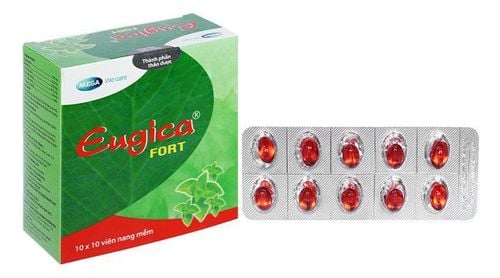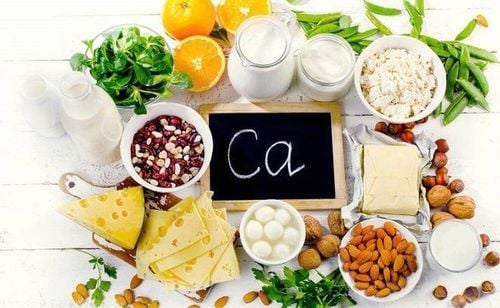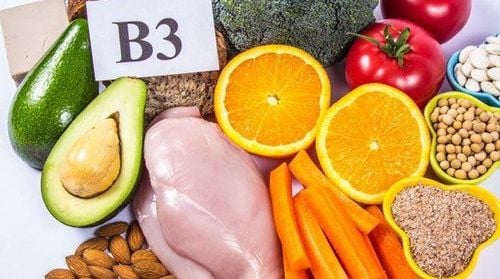This article was professionally consulted by Pham Thi Tuyet Mai, specialist level Il, MD – Obstetrician and Gynecologist at the Department of Obstetrics and Gynecology, Vinmec Hai Phong International General Hospital.
Viral illnesses are a significant concern for pregnant women. Many over-the-counter medications contain vitamin C, which may help support a weakened immune system during pregnancy and alleviate flu symptoms. However, the question of whether pregnant women can take vitamin C supplements remains a source of concern, as certain supplements and medications used during pregnancy may pose potential risks to the unborn baby.
1. What is in an Effervescent Vitamin C Tablet?
Various quick-acting supplements are widely available on the market, often marketed as “high-potency vitamin C.”
This term primarily refers to providing an adequate amount of vitamin C to meet the body's needs. Some vitamin manufacturers claim that their products are more easily absorbed than others, cause less digestive discomfort, and are more effectively absorbed into the bloodstream when combined with other vitamins.
The ingredients in an effervescent vitamin C tablet, aside from a high concentration of vitamin C, typically include:
- Zinc
- B-complex vitamins
- Other electrolytes, such as calcium and sodium
- Energy-boosting vitamins
- Probiotics
Some similar effervescent vitamin C products may contain lower doses of vitamin C along with vitamins D and E, melatonin, ginseng, and caffeine.

2. Can Pregnant Women Take Effervescent Vitamin C?
Consuming oranges daily in an attempt to ward off flu viruses or boost immunity can be impractical. Instead, there is significant appeal and convenience in simply dissolving an effervescent vitamin C tablet in a glass of water and consuming the full dose within minutes to support immune function.
However, the question of whether pregnant women can take effervescent vitamin C remains a concern, and it is advisable to consult a doctor beforehand. Most healthcare professionals recommend that pregnant women avoid the indiscriminate use of supplements to ensure
The World Health Organization (WHO) has examined various studies on the effects of vitamin C supplementation on pregnancy outcomes. While vitamin C has shown some benefits in certain cases, it has not consistently improved pregnancy outcomes in others. Consequently, WHO does not recommend widespread vitamin C supplementation during pregnancy. This does not imply that vitamin C is harmful to expectant mothers but rather indicates that there is insufficient data to conclusively determine whether the benefits outweigh the potential risks. Additionally, the specific effects of vitamin C on immune health during pregnancy have not been thoroughly studied.
In contrast, restrictions on vitamin C intake become more relaxed for breastfeeding mothers. Research suggests that lactating women can safely consume up to 1,000 mg of vitamin C daily - equivalent to the amount in an effervescent tablet - without adverse effects on themselves or their infants.

3. Vitamin C Recommendations During Pregnancy
The vitamin C content in effervescent supplements varies, with some containing up to 1,000 mg per serving.
According to nutritional guidelines, pregnant women aged 19 and older should consume 85 mg of vitamin C daily, while breastfeeding women in the same age group should receive 120 mg per day. For women under 19, the recommended amounts are slightly different - 80 mg during pregnancy and 115 mg while breastfeeding.
Regarding whether pregnant women can take effervescent vitamin C and the safe dosage to avoid adverse effects, manufacturers recommend not exceeding 2,000 milligrams of vitamin C per day. This is also the established daily upper limit for pregnant and breastfeeding women over 19 years old. While short-term consumption of more than 2,000 milligrams per day may not cause significant issues beyond mild digestive disturbances, some studies suggest that prolonged intake of high doses of vitamin C may increase the risk of kidney stone formation or excessive iron absorption, particularly in pregnant women.
However, dietary sources of vitamin C are not limited to effervescent tablets. Instead, fresh foods provide a safer and more effective way to meet the body's vitamin C needs. Pregnant and breastfeeding women should incorporate vitamin C-rich foods such as citrus fruits, red and green bell peppers, broccoli, cherries, spinach, and strawberries into their diet, as these are safe and natural sources of vitamin C. In cases of pregnancy-related nausea and vomiting, where food intake is limited and there is a need to supplement vitamin C, it is advisable to consult a doctor before starting to take effervescent vitamin C, especially during the first trimester.
Vitamin C supplements, including effervescent tablets, may be suitable for regular use, but there is limited evidence supporting their effectiveness in preventing illness during pregnancy. Rather than focusing solely on whether pregnant women can take effervescent vitamin C, maintaining a healthy lifestyle during these nine months is crucial. A balanced diet rich in vitamins and minerals, along with proper hand hygiene, can significantly boost immunity and prevent flu. If additional vitamin C supplementation is deemed necessary, it is advisable to consult a healthcare professional before use.
Please dial HOTLINE for more information or register for an appointment HERE. Download MyVinmec app to make appointments faster and to manage your bookings easily.
To arrange an appointment, please call HOTLINE or make your reservation directly HERE. You may also download the MyVinmec app to schedule appointments faster and manage your reservations more conveniently.








